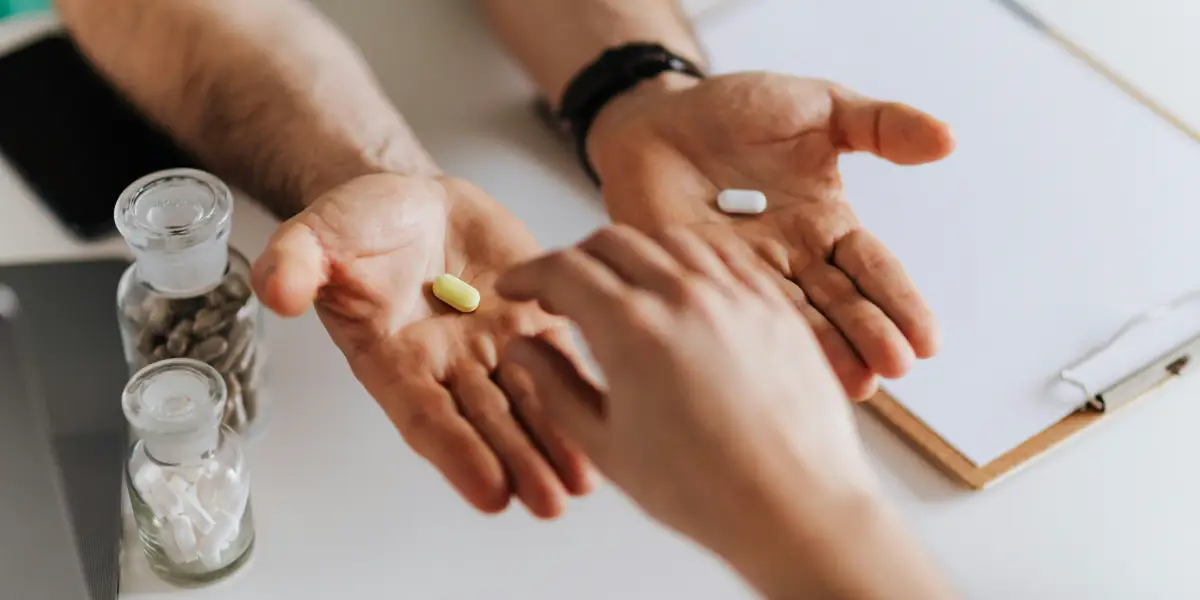What Is Medication-Assisted Treatment (MAT) for Fentanyl Addiction?
Medication-Assisted Treatment (MAT) is a comprehensive approach to treating fentanyl addiction that combines FDA-approved medications with behavioral therapies. This method is designed to help individuals safely overcome addiction, manage withdrawal symptoms, reduce cravings, and maintain long-term recovery. For those exploring this treatment option, understanding the benefits and components of MAT can be crucial.
MAT is particularly effective for fentanyl addiction because it addresses both the physiological and psychological aspects of addiction. By using medications such as methadone, buprenorphine, and naltrexone, MAT helps stabilize brain chemistry, reduce the risk of relapse, and support individuals in their recovery journey.
How Do Medications Used in MAT Help with Fentanyl Addiction?
The medications used in MAT for fentanyl addiction play a crucial role in managing withdrawal symptoms and reducing cravings. They work by interacting with the brain’s opioid receptors, either by mimicking the effects of opioids or blocking them entirely. Understanding the risk factors for addiction can also aid in tailoring MAT effectively.
Methadone and Buprenorphine
These medications bind to the same opioid receptors in the brain as fentanyl, helping to reduce cravings and alleviate withdrawal symptoms without producing the intense high associated with fentanyl. This stabilization of brain chemistry allows individuals to focus on recovery and reduces the risk of relapse and overdose.
Naltrexone
This medication works differently by blocking opioid receptors, preventing fentanyl from having any effect if used. It helps reduce the risk of overdose by stopping the euphoric effects of opioids.
These medications are prescribed and supervised by healthcare professionals to ensure safe and effective use. MAT is not about substituting one addiction for another but about treating the physiological and psychological aspects of addiction to support recovery.
What Role Do Behavioral Therapies Play in MAT?
Behavioral therapies are an integral component of MAT, providing individuals with the tools and strategies needed to address the underlying causes of addiction and develop healthier coping mechanisms. Recognizing the signs and symptoms of addiction is a crucial step in tailoring these therapies effectively.
Cognitive Behavioral Therapy (CBT)
CBT helps patients modify drug use behaviors, manage triggers, and develop coping strategies. It focuses on changing negative thought patterns that contribute to substance use and equips individuals with skills to handle stressful situations without resorting to drugs.
Contingency Management
This approach uses positive reinforcement, such as vouchers or rewards, for maintaining sobriety. By providing tangible incentives, it encourages individuals to stay committed to their recovery goals.
Motivational Interviewing
Motivational Interviewing addresses mixed feelings about recovery and supports motivation for change. It helps individuals resolve ambivalence and strengthens their commitment to making positive changes in their lives.
These therapies help address underlying issues contributing to addiction and improve decision-making skills, which are crucial for sustained recovery.
What Are the Benefits of MAT for Fentanyl Addiction?
Medication-Assisted Treatment offers numerous benefits for individuals struggling with fentanyl addiction, making it a highly effective treatment option. Understanding the risk factors for addiction can further enhance the effectiveness of MAT by addressing co-occurring mental health disorders.
1. Relief from Withdrawal Symptoms
MAT provides relief from severe withdrawal symptoms like cravings, anxiety, and physical discomfort. By alleviating these symptoms, individuals can focus on recovery without the constant burden of physical and psychological distress.
2. Reduced Risk of Overdose
By stabilizing brain chemistry and blocking opioid effects, MAT reduces the risk of overdose. This is particularly important for individuals with a history of fentanyl use, as it minimizes the chances of life-threatening situations.
3. Enhanced Engagement in Therapy
MAT supports engagement in counseling and therapy, addressing root causes of addiction. By reducing withdrawal symptoms and cravings, individuals are more likely to participate actively in therapeutic interventions.
4. Improved Treatment Retention
MAT improves treatment retention and increases the likelihood of maintaining sobriety. With a structured approach that combines medication and therapy, individuals are more likely to stay committed to their recovery journey.
5. Benefits for Pregnant Individuals
For pregnant individuals, MAT with methadone or buprenorphine is recommended as it leads to better prenatal care adherence and healthier outcomes for both mother and baby. It ensures that both the mother and the developing fetus receive the necessary care and support during pregnancy.
Overall, MAT offers a comprehensive approach that addresses both the physical and psychological aspects of addiction, supporting long-term recovery.
How Is MAT Administered and Supported?
MAT programs are carefully structured to provide individuals with the support and resources needed for successful recovery. The treatment process typically involves several key components. Recognizing an overdose and administering naloxone is an essential skill for those involved in MAT programs.
Regular Medical Appointments
Regular medical appointments are necessary to monitor medication effects and adjust dosages as needed. These appointments ensure that the treatment plan is tailored to the individual’s needs and that any side effects are managed promptly.
Coordination with Counseling
Coordination with outpatient counseling and behavioral therapies ensures a comprehensive approach to treatment. By integrating medical and therapeutic interventions, individuals receive holistic care that addresses all aspects of their addiction.
Family Support and Education
Family support and education on relapse prevention are crucial for long-term success. Involving family members in the recovery process provides a strong support network and helps individuals navigate challenges effectively.
Ongoing Monitoring
Ongoing monitoring is essential to ensure safety and address any challenges during recovery. Regular check-ins with healthcare providers and therapists help individuals stay on track and make necessary adjustments to their treatment plan.
By combining medication with counseling and therapy, MAT addresses both the physical and psychological aspects of addiction, providing a comprehensive approach to recovery. This means that not only are cravings and withdrawal symptoms reduced, but underlying mental health issues are also addressed.
What Makes Carrara Rehab Unique?
At Carrara Rehab, we redefine addiction recovery by offering an ultra-luxury experience that combines privacy, comfort, and comprehensive care. Our Malibu location provides a serene setting where individuals can focus on healing without distractions. We cater to high-profile clients who require discretion and a personalized approach to treatment.
Our facility is designed to meet the unique needs of each client, ensuring that their psychological, emotional, and physical well-being is prioritized. From private rooms with ensuite bathrooms to gourmet meals and state-of-the-art fitness facilities, every aspect of Carrara Rehab is tailored to promote a comfortable and effective recovery journey.
What Are the Key Benefits of Choosing Carrara Rehab?
Choosing Carrara Rehab means embracing a recovery experience that is both luxurious and transformative. We offer a range of amenities and therapies that set us apart from traditional rehab centers, ensuring that our clients receive the highest standard of care.
Ultra-Luxury Amenities
- Private Rooms: Enjoy the privacy and comfort of your own space, complete with an ensuite bathroom.
- Gourmet Meals: Savor delicious meals prepared by professional chefs, tailored to your nutritional needs.
- Fitness Facilities: Access state-of-the-art equipment and personal trainers to support your physical wellness.
- Spa Services: Relax with massages, facials, reflexology, and more in our luxurious spa.
Holistic Therapies
- Cranial Sacral Therapy: Experience gentle techniques to relieve stress and tension.
- Yoga and Mindfulness: Engage in practices that promote mental clarity and emotional balance.
- Acupuncture and Reiki: Benefit from ancient healing methods that enhance your recovery.
- Sound Baths and Aromatherapy: Immerse yourself in sensory experiences that soothe the mind and body.
Why Is Carrara Rehab the Ideal Choice for High-Profile Clients?
For individuals who require a high level of privacy and confidentiality, Carrara Rehab offers a discreet and secure environment. Our facility is designed to provide a sanctuary where clients can focus on their recovery without fear of exposure. This makes it an ideal choice for celebrities, executives, and those in elite social circles.
Our high staff-to-patient ratio ensures that each client receives personalized attention and care. With a comprehensive approach that includes evidence-based therapies and holistic treatments, Carrara Rehab supports clients in achieving long-term health and well-being. Explore our luxury locations, including The LA Carrara House, The Hollywood Hills Carrara House, and The Malibu Beach House.
Ready for a Transformative Experience?
Take charge of your recovery by joining our elite rehab program in Los Angeles. Immerse yourself in a sanctuary where clinical proficiency meets five-star comfort—ready to guide you toward renewed health and hope. Elevate your life today by embracing a journey that prioritizes your physical, mental, and emotional well-being.
- Streamlined Admission: Get started with a personalized, hassle-free intake designed around your needs.
- Aftercare Support: Benefit from an ongoing continuum of care, ensuring you have the resources and encouragement necessary to maintain your progress.
Take the first step toward a healthier, more fulfilling life by contacting us today.
Dr. Blair is a licensed clinical psychologist working in the field for twelve years. She went to college in New York City before moving to Southern California and completing her graduate work. She has worked in various roles in treatment, including being a therapist, group facilitator, working in administration, and writing curriculum. Dr. Blair is passionate about addiction and individual and family therapy and continues to love her work in both private practice and treatment centers.




